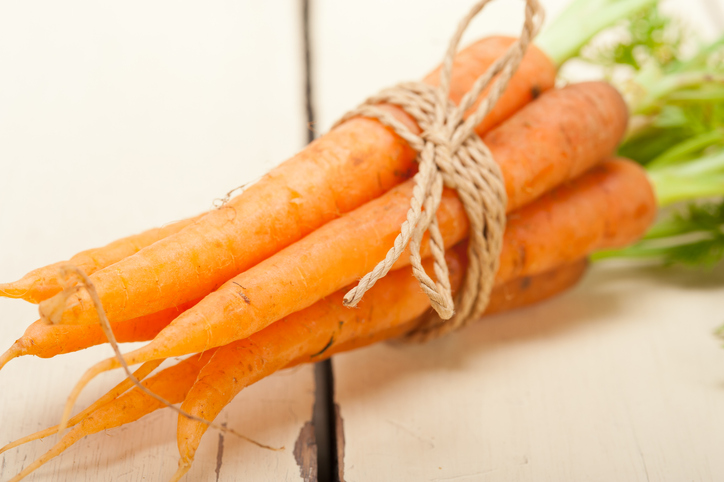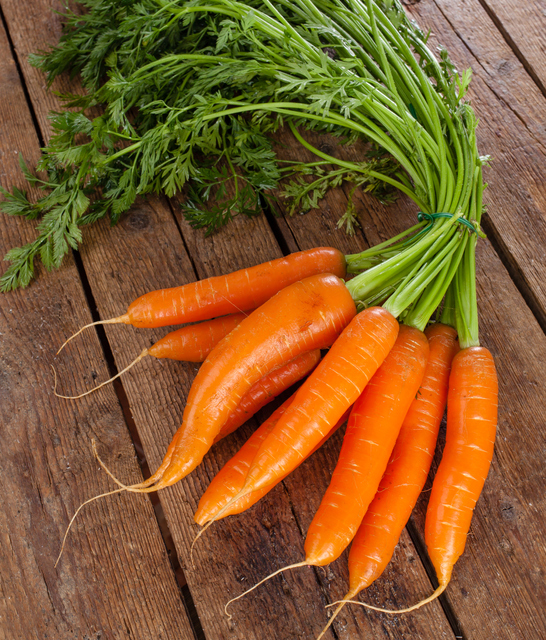Mark Bittmanonce said, “The truly healthy alternative to that chip is not a fake chip; it’s a carrot.”
After reading this article and all the different benefits that carrots have, you will surely agree with this statement.
Carrots are a root vegetable, and it is said that they originated in Persia where they were cultivated for medicinal reasons, and not as a food item.
The carrots we eat today are the domesticated form of the wild carrots called Daucus Carota. Carrots are usually colored orange but carrots are also found to be white, yellow, red, black.
The History of Carrots
Carrots that are cultivated today were primarily derived from wild carrots. These wild carrots were cultivated for their seeds, leaves, and medicinal reasons. The early Greek and Roman writings have the reference of edible white roots in them, and as we know, the wild carrots have whitish-colored roots, and the reference may be about the wild carrots or parsnips, which are closely related to carrots. Or maybe it can be about both.
The earliest carrots date from the Persia and Asia Minor of the 10th century. It is believed that these earliest carrots were purple or white-colored originally, and a mutant occurred that caused the purple color from the carrots to vanish, and a new race was formed. This new race might have been yellow, and the orange-colored carrots might have subsequently developed from them.
Central Asia is considered the center of diversity for carrots. For its storage root, the first cultivation of this vegetable is reported to be in the region of Afghanistan, about 1,100 years ago from today.
Largest Producers of Carrots
A very surprising fact about carrots is that it is one of the top 10 economically important vegetable crops in the world. The largest amount of carrots is produced by China, about 45% of the total global production of carrots in the year 2011. Russia and America are ranked as the second and third largest producers of carrots, respectively.
Different Kinds of Carrots
Carrots that are grown around the world are not the same. Many varieties of carrots are grown all around the world. Two of the main broad categories are:
- Eastern or Asiatic Carrots
- Carotene or Western Carrots
However, these broad categories can be further divided into:
- Danvers
- Nates
- Imperator
- Chantenay
- Ball or Mini
1. Eastern or Asiatic Carrots
Often known as anthocyanin carrots due to the purple/black color of their roots, these Asiatic cultivars are mostly grown in Pakistan, Turkey, India, Egypt, and Afghanistan. These carrots have pubescent leaves that give them a gray-green color. A great diversity of eastern carrots is found in countries like Russia, Afghanistan, India, and Iran, which are the possible centers of carrot domestication that took place in the 10th century. In Asia, anthocyanin carrots are still cultivated, but they have been largely replaced by Western orange-rooted carrots.
2. Carotene or Western Carrots
The western carrots have roots that are orange-red or white. It is considered that these carrots might have primarily grown in Turkey, from where they spread all around the world and are grown almost everywhere today.
First-ever carotene carrots were cultivated in the Netherlands. And the current day cultivars of these carrots seem to have originated from the long orange varieties of carrot developed and found there.
Some Interesting Facts about Carrots

Carrot is no ordinary vegetable. Contained within its orange body are so many health benefits that one cannot help but be drawn towards them. Here are some of the most interesting facts about carrots.
- There are about 100 or more species of carrot in existence.
- The name of this vegetable, “carrot,” is derived from the Greek word “Karoton.”
- The beta-carotene found in carrots was specifically named for the carrot itself.
- In colonial America, the carrot was introduced by the European settlers in the 17th
- Carrot cannot grow in summer; it needs cool to moderate temperatures for proper growth.
- The foliage of a carrot plant can grow to a height of about 59 inches when flowering.
- The edible roots of this plant can grow anywhere between 2 to 20 inches long.
- After potatoes, carrots are the second most popular vegetable crop in the world.
- Carrots are referred to as the ultimate health food.
- They can clean your mouth by scraping off plaque just like toothpaste and toothbrush. They stimulate the gums and trigger the production of saliva. The minerals present in carrots can help avoid tooth damage.
- Carrots are 88% water.
Health Benefits
Along with being delicious and crunchy, carrots have many health benefits too. These health benefits are the reason why this vegetable is so popular and in high demand. The health benefits it has to offer include:
- Carrots are weight-loss friendly.
- A good source of fiber, beta-carotene, vitamin K1, magnesium, and some antioxidants.
- The beta-carotene present in carrots, which is converted into Vitamin A by our bodies, helps in the development and growth of the immune system, promotes good vision, and treats night blindness.
- Carrots are rich in carotenoids that can help in preventing several types of cancer, e.g., prostate, stomach, and colon cancer.
- Eating carrots can help lower the cholesterol level of the blood.
Nutritional Profile
Carrots feel crunchy and are a highly nutritious food to add to your diet. The water content of carrots ranges from 86 to 95 percent, with 10 percent carbs and very little fat and protein. You can say that carrot is a mixture of water and carbs. 100 g of carrot roughly contains:
- 41 calories
- 88 percent water
- 9 g protein
- 6 g carbs
- 7 g sugar
- 8 g fiber
- 2 g fat
Several vitamins and minerals in carrots make them a perfect candidate for achieving your daily nutrition goal. Carrots contain beta carotene, biotin, vitamin K1, Potassium, and vitamin B6.
Popular Carrot Dishes

Ever wondered how many delicious dishes can be made from carrots? If yes, then you will be delighted to know about all the famous carrot dishes. Following is a list of dishes made from carrots all around the world:
- Carrot cake
- Carrot juice
- Carrot salad
- Carrot pudding
- Gajarkahalwa (a sweet dish from the Indian subcontinent)
- Carrot chips
- Mashed carrots
- Tzimmes (a traditional Ashkenazi dish)
- Morkovcha (a traditional Korean carrot salad) and many more.
Downsides of Eating Too Many Carrots
Everything that exceeds limits can have some consequences. We as human beings should never act like Bugs Bunny and eat carrots all the time.
Too much intake of carrots can cause a condition called carotenemia. When consumed in excessive amounts, the beta-carotene present in carrots can change our skin color to orange-yellow. This condition is relatively not harmful, but in extreme conditions, it can stop Vitamin A from performing its job and might affect your vision, hair, skin, and immune system.
FAQs- An Ultimate Guide to Carrots
1. How do you grow perfect carrots?
Carrots are easy-to-grow vegetables that can be cultivated at home. If you want to do so, you have to make sure that the soil is of high quality.
The soil should be free from weeds, grass, rocks, sticks, and other kinds of debris that may hinder the growth of the carrot. If the soil is clean, then the carrot will have enough space to grow and spread its roots. This means that the carrots you will harvest will be long and perfectly shape as they will grow without any obstruction.
Another factor to keep in mind is that carrots grow best in raised beds as compared to the ground. The beds should be around 4 feet wide and should have enough space so that you can reach into them.
An additional tip is to not walk around or very close to your plant. The reasoning behind this is that walking compresses the soil. Compressed soil means that the roots will have to work harder to penetrate the soil. Compacted soil will most definitely impact the size of the carrot.
2. Are Carrots good for fat loss?
Carrots are a good source of fiber. They contain enough fiber if consumed regularly, to help avoid constipation and other stomach-related issues. Fiber is also undigestable. Hence, is good for those who want to lose fat.
Additionally, carrots are known for being very useful in maintaining healthy cholesterol levels. It ensures that your arteries are not relentlessly being deposited with fat. Fat-free arteries help prevent heart diseases.
Many studies have also proven that the addition of carrot juice to your daily diet may do wonders for fact accumulation. Hence, with the addition of sufficient carrots to your diet, you may lose weight.
3. Should Carrots be consumed daily?
A Carrot is an extremely healthy vegetable that has a lot of health benefits. Like all vegetables, carrots are okay when consumed in moderation. However, if you consume carrots in excess, you may run into a few issues.
Excess carrot consumption can cause a condition called carotenemia. In this disease yellow discolorations appear on your skin. These discolorations show up because of the deposition of beta-carotene that is present in carrots.
Anything in moderation is good however, we should be careful to not consume too much of anything especially not carrots.
It is recommended to eat around one to two carrots daily or every few days. It was found that consumption of 3 to 10 carrots daily might turn you orange within a few weeks.
4. Is eating carrots at night bad?
No, carrots are perfectly okay when consumed at night. This vegetable, in particular, is considered night-friendly. When the midnight grumbles hit, carrots can be an excellent replacement for much more calorie-dense options such as fried potato or other snacks. Carrots also have a lot more nutrients which are perfect for some mindless munching.
Conclusion
If you have not added carrots to your diet yet, do it right away. With all the health benefits and deliciousness, carrots can be the Holy Grail for your health. No matter how you eat it, carrots will always be a healthy choice for you. Filled with so many minerals and healthy components, carrots can boost your metabolism and promote a better immune system. This veggie can be a healthy snack with all the health benefits it provides.
Want to lose weight? Eat carrots. Want a good vision? Eat carrots. Want good hair and skin? Eat carrots, but in a moderate amount. Carrots can help you with all of these issues. Now, you must not wonder why rabbits are so cute; that’s because they eat carrots.

